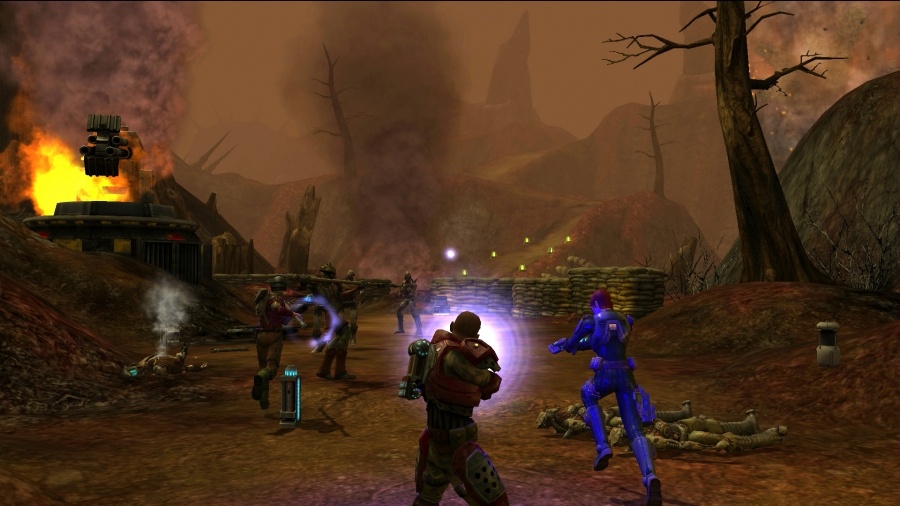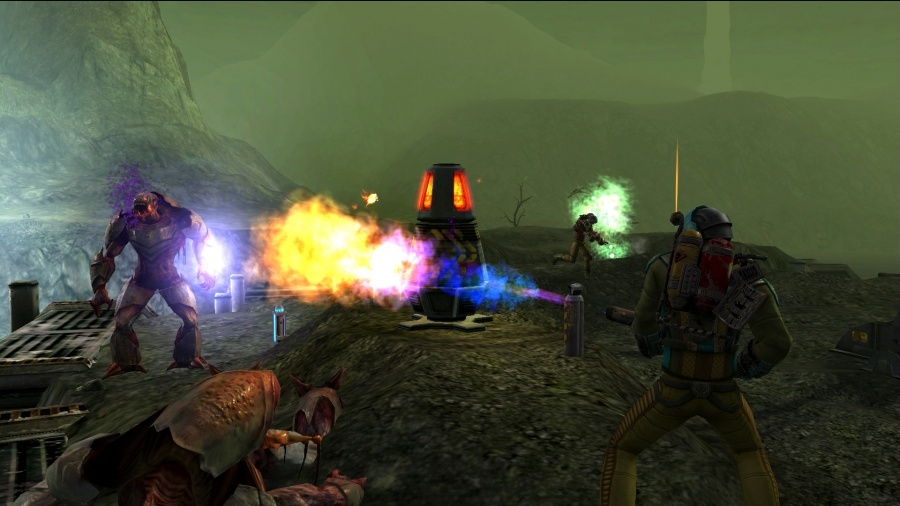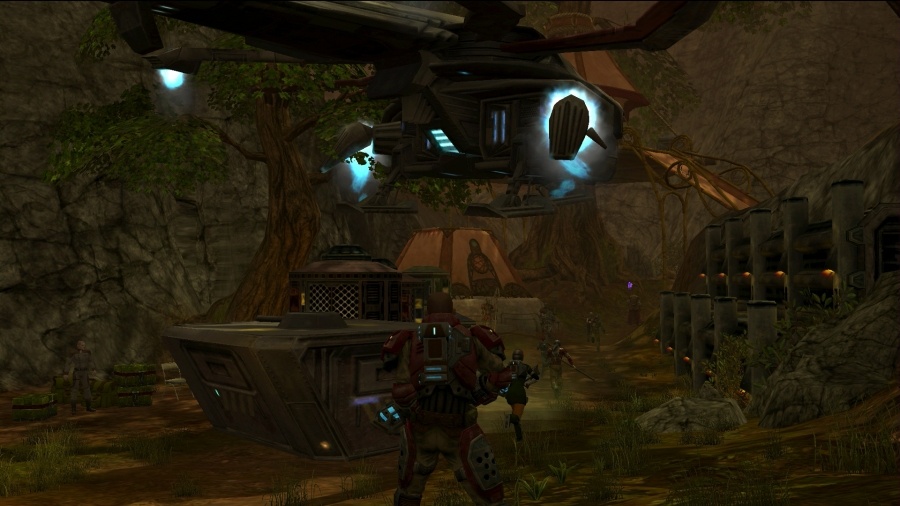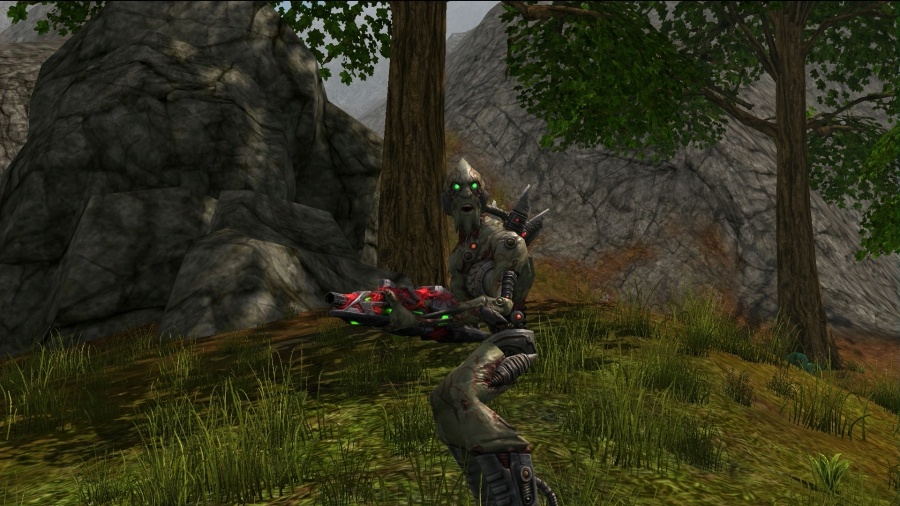Tabula Rasa Updated Q&A - Missions and Mission Design
Mission designer Rebekah Tran fills us in on the different types of quests and missions you'll undertake in this sci-fi massively multiplayer online role-playing game.
Arriving next month is Tabula Rasa, the long-awaited game from Richard "Lord British" Garriott, creator of classic role-playing games like Ultima and Ultima Online. As a massively multiplayer online role-playing game, Tabula Rasa is a bit like World of Warcraft and EverQuest in that you'll be able to explore huge online worlds alongside thousands of other players. However, while World of Warcraft and EverQuest are fantasy-themed games, Tabula Rasa is science fiction. The game is set on alien worlds in the distant future, and humanity is part of the Allied Free Sentients, a coalition of races battling the evil Bane. Like in many MMOs, you'll have to pursue missions. However, the mission design in Tabula Rasa will strive to make it feel like you're taking part in military operations to free worlds. To learn more, we caught up with mission designer Rebekah Tran.
GameSpot: Tell us about the way players find and accept missions in the game. Will all missions have in-depth briefings?
Rebekah Tran: There are two ways to accept missions in Tabula Rasa. The first is the traditional way of finding a non-player character at a base or town that needs you to do something. The second is via a radio transmission, which is how we dispense missions while you're on the go. The way this works is an alert pops up that opens a mission dialog box containing a mission for you to do. The great part about this is that we can dispense new objectives on the go as opposed to requiring you to run back to a safe zone in order to progress. This really helps keep you in the action and adds to our military feel.

As far as the mission briefings go, we try to keep things as succinct as possible while still conveying the backstory and the reason why you are being sent on this objective. For those that like to read text and learn the backstory, there is a ton of content there. However, for those that just want to know immediately where to go and what to do, we have audio voice one-liners which give the brief rundown of the mission in addition to having objective indicators which show you specifically where you need to go to complete an objective.
GS: Give us a sense of the scale and scope of missions in Tabula Rasa. Will players only be killing 10 rats and returning them to the rat catcher? Will there be larger-scale, longer-term missions?
RT: You definitely will not be just killing X monsters while in Tabula Rasa. All of the designers work very hard to keep the feeling of a war in progress throughout the entire game, so most missions are very military in nature. Destroy a signal-jamming communications tower, protect a specialist while he hacks an enemy computer, gather intel on an enemy, [and] plant a communication spike to call in reinforcements and avoid enemy detection while infiltrating a base are just a few examples of things that you can do in our game. Not only do we have a gamewide, multicontinent mission arc, but the instances [a private copy of the world made for the player] really allow us as designers to craft very special experiences for the player.
GS: Tell us about the variety of missions that will be in the game. What will players be doing besides killing X number of monsters?

RT: Protection, elimination, retrieval, destruction, and infiltration missions are just a few of the categories of missions that you'll see while in Tabula Rasa. As I mentioned before, we really want the player to feel like a soldier in an epic battle, so the more missions we can do that feel like they're military objectives the better. Beyond this, we have many missions which have a branch in them. This can mean you received two objectives, but can only complete one, or you have two ways to complete a task. In the end, we try to make it so that the choices you make on these missions influence the type of experience you're going to have in the game.
However, we all recognize that sometimes it's fun to be on a major mission and get a little recognition for the number of things you do wipe out with your chainguns. For that, we have a series of missions that we call "targets of opportunity," which are missions to be done alongside other missions. In these missions, as you complete the objective you will gain in-game titles so you can show others how awesome you are. I'm a little bit of a completionist, so I'm always gunning to get the veteran map title. Once I complete every mission on an overland map, I'll get this title and can then flaunt the fact that I'm awesome to everyone. There are currently about 10 different titles you can get per overland map, so there are definitely ways to show your achievements in the game.
GS: How do the missions play into the game's story, which seems to offer a morally ambiguous structure, rather than the typical black-and-white, good-and-evil experience we normally see in massively multiplayer games?

RT: Morally gray missions are a hallmark of Richard Garriott's game design philosophy. As a result, we have put a lot of these types of missions in and tried to make sure the choice you make is an action more than just a text choice. This way you actively have to make a decision that is going to affect something else in the game. As an example, in Torcastra Prison there is a soldier who is being converted into an evil cyborg-type creature we call a machina. He asks you to kill him out of mercy, but AFS high command wants you to bring him in so information can be extracted from him. The question is, do you honor the wish of a dying man and kill him while he still has his dignity, or do you follow orders and escort him out of the prison because it's not your job to be an executioner? Depending on what you decide to do, a new set of missions will open up and change the experience you have.
GS: How will accepting certain missions and completing them in favor of certain parties affect the opportunities and advanced missions that players will have access to later? Will there be full-on political factions that players might try to get closer to by completing missions only for those groups?
RT: Every overland map and many of the instances contain branching missions. When you complete branching missions [in] certain ways it will affect the missions available to you and the way that you can complete them. In Tabula Rasa, it's your actions and decisions that influence your gameplay experience over the long run.
GS: We understand that aside from story-based missions, there will be other running missions in the game, such as raid-style missions to recapture bases from alien invasions. Tell us about these types of missions. How easily accessible will they be for advanced players?
RT: Control points are the places where the Bane will be constantly pushing against the players for control of AFS and Bane bases. When the AFS has control of a control point, you'll have missions, vendors, teleporters, and graveyards available to you that aren't available when the Bane is in control of that area. The beauty of it is that when the Bane try to take a base (or when players want to take control of a Bane base), it's as easy as showing up to a location and rallying troops to that area--there are no special prerequisites. However, just because you captured a base before bed last night doesn't mean it's still going to be in AFS hands once you log in after work the next day. These are active battlefields--they need to be actively defended by players and give great rewards for doing so.
GS: Will there be any other types of pick-up-and-play missions in the game for players who are between groups or are playing at off-hours when their usual group of friends isn't around?

RT: Just like in other games, you can group up with people you meet in common areas, so you don't have to wait for your friends to play. Also, there are a ton of missions that can be done on an overland map outside of a group. Beyond that, there is crafting, control points, player-versus-player, and searching out Logos to keep players occupied while their buddies are offline. That being said, the number of hostile targets in an instance will scale based on how many people are in the instance. This means that although it's very challenging to do instances solo, there's a chance that a skilled player can get through an instance alone.
GS: Finally, is there anything else you'd like to add about the game's missions, or about Tabula Rasa in general?
RT: Tabula Rasa is one of those games that tries to focus on the fun and is as deep as you want it to be. If things are busy, I can pop in for a quick control point raid. If I have more time I can run through instances, try to get more player titles, advance my character, or craft some enhancement to aid me in PVP. With Tabula Rasa I don't have to spend hours preparing to play, I can just jump right in and get straight to the fun.
Not to mention, I've been completely spoiled by the mission objective indicators. Gone are the days of running a game and running a Web browser with a fan site up telling me where to go. Love that!
GS: Thank you.
Got a news tip or want to contact us directly? Email news@gamespot.com
Join the conversation